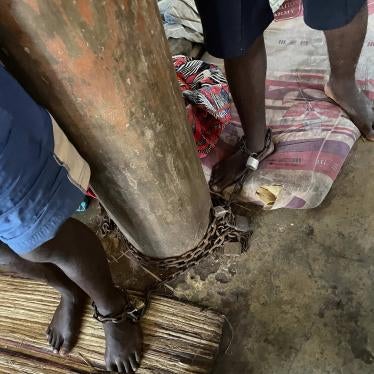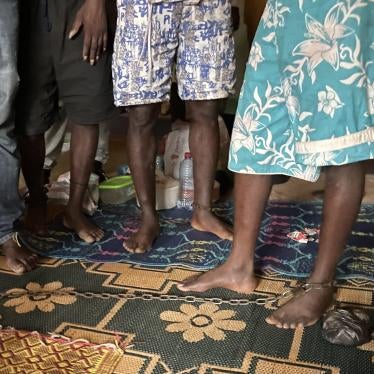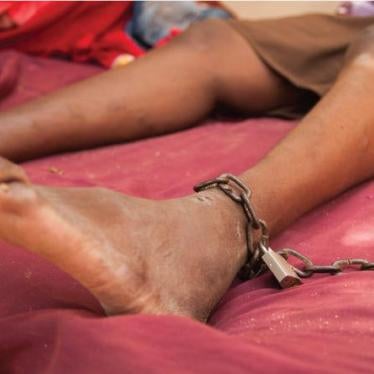February 2023
Human Rights Watch welcomes the opportunity to provide input to the Committee on the Rights of Persons with Disabilities (the “Committee”) ahead of its upcoming review of Togo. This submission highlights areas of concern that Human Rights Watch hopes will inform the Committee’s consideration of the Togolese government’s compliance with its obligations under the Convention on the Rights of Persons with Disabilities (CRPD). The submission relates to Togo’s compliance with articles 5, 6, 12, 13, 14, 15, 16, 17, 19, and 25 of the CRPD. It proposes issues that Committee members may wish to raise with the government of Togo.
Human Rights Watch is an independent, international human rights organization that monitors, reports, and conducts advocacy on human rights in more than 90 countries globally. Partnering with people with disabilities and their organizations across the globe, we work to ensure that the voices of people with disabilities are heard, in line with the disability movement’s motto “Nothing About Us, Without Us.”
Shackling of People with Psychosocial Disabilities (articles 5, 6, 12, 13, 14, 15, 16,17, 19, and 25)
In October 2020 Human Rights Watch published a report, “Living in Chains: Shackling of People with Psychosocial Disabilities Worldwide,” documenting the practice of shackling of people with psychosocial disabilities in 60 countries around the world, including in Togo.[1] The report found that globally hundreds of thousands of men, women, and children—some as young as 10—with psychosocial disabilities have been shackled—chained or locked in confined spaces—at least once in their lives. Many are held in overcrowded, filthy rooms, sheds, cages, or animal shelters and are forced to eat, sleep, urinate, and defecate in the same tiny area.[2]
The inhumane practice of shackling exists due to inadequate support and mental health services as well as widespread beliefs that stigmatize people with psychosocial disabilities.[3] Shackling often occurs in homes because there are no services available in the community and families who struggle to cope with the demands of caring for a relative with a psychosocial disability may feel they have no choice but to shackle them.[4] The time periods range from days and weeks, to months, and even years.
In Togo, shackling is practiced in prayer camps and traditional healing centers, often run by self-proclaimed prophets.[5] In some cases, people with psychosocial disabilities can be chained at home by their relatives, due to lack of mental health support and services in the community.[6]
The nature of shackling means that people live in very restrictive conditions that reduce their ability to stand or move at all.[7] People who are shackled to one another are often forced to go to the toilet and sleep together. Shackling impacts a person’s mental as well as physical health. A shackled person can be affected by post-traumatic stress, malnutrition, infections, nerve damage, muscular atrophy, and cardio-vascular problems.
The UN Special Rapporteur on torture and other cruel, inhuman or degrading treatment or punishment has noted that shackling “unequivocally amount[s] to torture even if committed by non-State actors under conditions in which the State knows or ought to know about them.”[8]
Human Rights Watch asks the Committee to consider including the following recommendations in its concluding observations on Togo:
- Ban shackling in law and in practice.
- Conduct public information campaigns to raise awareness about psychosocial disabilities and the rights of people with disabilities, especially among alternative mental health service providers and the broader community, in partnership with people with lived experiences of psychosocial disability.
- Develop a time-bound plan to shift progressively to voluntary community-based mental health support, and independent living services.
- Comprehensively investigate state and private institutions in which people with mental health conditions live, with the goal of stopping chaining and ending other abuses.
- Create and carry out a deinstitutionalization policy and a time-bound action plan, based on the values of equality, independence, and inclusion for people with disabilities. Preventing institutionalization should be an important part of this plan. The government should include people with disabilities and their representative organizations in developing and carrying out the plan.
- Conduct public information campaigns to raise awareness about psychosocial disabilities and the rights of people with disabilities, especially among alternative mental health service providers and the broader community, in partnership with people with lived experiences of psychosocial disability.
[1] Human Rights Watch, Living in Chains: Shackling of People with Psychosocial Disabilities Worldwide, October 6, 2020, https://www.hrw.org/sites/default/files/media_2020/10/global_shackling1020_web_2.pdf.
[2] Ibid., pp. 3, 12-13, 37.
[3] Ibid., p. 3.
[4] Ibid., p. 9.
[5] Human Rights Watch phone interviews with Peace Vera Ahadji, Hands from Above, September 20, 2019; Pascal Douti, Association Vie Libérée, September 3, 2019; and Laure Akofa Tay, CBM, September 12, 2019; Benedict Carey, “The Chains of Mental Illness in West Africa,” New York Times, October 11, 2015, https://www.nytimes.com/2015/10/12/health/the-chains-of-mental-illness-in-west-africa.html (accessed February 10, 2023); "The Chained of Togo" ("Les enchaînés de Togo"), TF1, May 26, 2019, https://www.tf1info.fr/international/sept-a-huit-les-enchaines-de-togo-2122289.html (accessed February 10, 2023); Ron Claiborne, "Living In Chains: Patients with Mental Illness in West African Prayer Camps," post to "Second Acts" (blog), May 12, 2022, https://secondacts.bulletin.com/living-in-chains-mental-patients-in-west-african-prayer-camps/ (accessed February 10, 2023); "Gregoire Ahongbonon: Freeing people chained for being ill," BBC News Online, February 17, 2016, https://www.bbc.com/news/magazine-35586177 (accessed February 10, 2023); "Chains, an option against mental illness" ("Les Chaînes, une option contre les Maladies Mentales,) Creuset Togo, October 11, 2019, https://www.creusetogo.org/les-chaines-une-option-contre-les-maladies-mentales/ (accessed February 10, 2023).
[6] Human Rights Watch phone interviews with Pascal Douti, Association Vie Libérée, September 3, 2019; and Laure Akofa Tay, CBM, September 12, 2019.
[7] Human Rights Watch, Living in Chains, https://www.hrw.org/sites/default/files/media_2020/10/global_shackling1020_web_2.pdf, p. 15.
[8] UN Human Rights Council, Follow up report of the Special Rapporteur on torture and other cruel, inhuman or degrading treatment or punishment on his follow-up visit to the Republic of Ghana, February 25, 2015, https://undocs.org/en/A/HRC/31/57/Add.2 (accessed July 14, 2022), para. 72.








